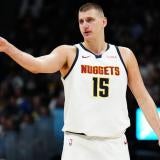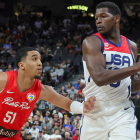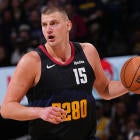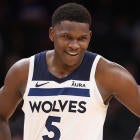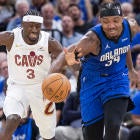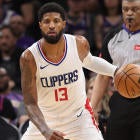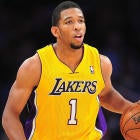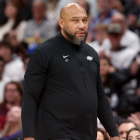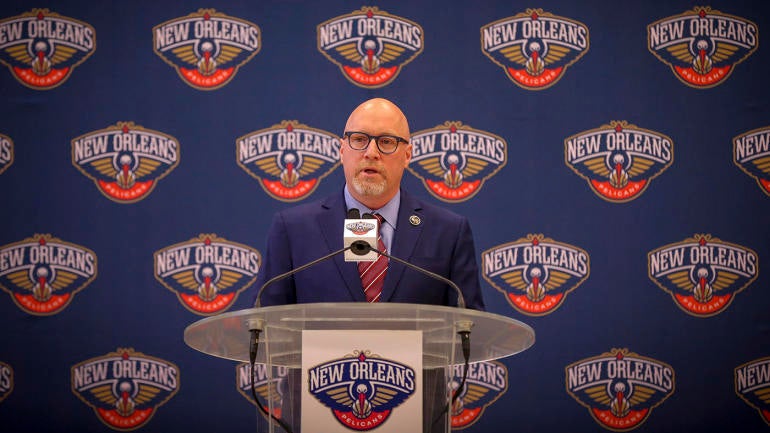
Two years and two head coaches ago, the New Orleans Pelicans traded Anthony Davis for just about everything the Los Angeles Lakers could offer. Heading into free agency that summer, they had $31 million in cap space and Zion Williamson, Jrue Holiday, Lonzo Ball, Brandon Ingram, Josh Hart, Christian Wood, Kenrich Williams, Nickeil Alexander-Walker and Jaxson Hayes on the roster, plus two future first-round picks and a first-round pick swap from the Lakers and a potential first-round pick (or at least two seconds) from the Atlanta Hawks.
The possibilities were endless. The picks meant that the Pelicans didn't have to stink for the first few years of Williamson's career, and the young core meant they didn't have to sprint into win-now mode, either.
Have they established themselves as a playoff team since then? No. Have they made the most of all that cap space and flexibility? Also no. Last week, they traded down in the draft and gave up one of those Lakers picks in order to clean up the cap sheet they'd clogged in the previous offseason. This week, David Griffin's front office has been roundly mocked for failing to sign Chris Paul or Kyle Lowry and instead sending Ball, a restricted free agent, to the Chicago Bulls in exchange for Garrett Temple, Tomas Satoransky and a second-round pick, then trading a lottery-protected first for restricted free agent Devonte' Graham.
This was definitely not Plan A, but I can at least understand how it happened. New Orleans took a calculated risk and pivoted when it didn't work out. Reasonable people can disagree about the wisdom of paying Ball $85 million over four years.
It is harder to comprehend, though, just how this team has ended up in such a nebulous place. With the caveat that we don't know what's going to happen with Hart's restricted free agency, here are four significant decisions that led the team here:
- 1. The 2019 spending spree: In an attempt to be competitive right away, the Pelicans signed JJ Redick, traded two second-round picks for Derrick Favors and imported Nicolo Melli from Fenerbahçe. These moves were widely praised at the time, and, for a decent stretch before the hiatus, Griffin's plan seemed to be coming together. Alas, New Orleans was awful in the bubble and finished 30-42 in Williamson's injury-plagued rookie season under former coach Alvin Gentry.
- 2. The one that got away: How different might that season have been if Wood had gotten some of the minutes that went to Hayes, Melli and Jahlil Okafor? As a 23-year-old, Wood finished the 2018-19 season with a string of productive games for a Pelicans team that was going nowhere, and Griffin's front office inherited him on a $1.6 million non-guaranteed contract. New Orleans chose to waive him, though and Detroit claimed him off waivers. All he's done since is put up virtually the same per-minute numbers, with more accurate shooting, and turn into a core part of Houston's future.
- 3. The Jrue trade: Sixteen months after saying in multiple interviews that the Pelicans were Holiday's team and that Holiday could make a Steve Nash-like leap to MVP candidacy, Griffin traded him to the Milwaukee Bucks in a multi-team blockbuster. It was a success in that it brought them two unprotected first-round picks and two pick swaps from Milwaukee. The value of those picks decreased the moment that Giannis Antetokounmpo signed his extension, though, and the whole thing would look much better in retrospect if New Orleans hadn't given up Williams and a first-round pick and rerouted George Hill to Oklahoma City for the privilege of giving Steven Adams a two-year, $35 million extension. Griffin let Favors walk in free agency and touted the toughness of Adams and Eric Bledsoe, acquired from Milwaukee, but would dump both of them following a 31-41 season under now former coach Stan Van Gundy.
- 4. The Redick trade: Simultaneously infamous and inconsequential, the trade that sent Redick and Melli to the Dallas Mavericks at the 2021 trade deadline netted New Orleans Wes Iwundu, the expiring contract of James Johnson and what turned out to be the No. 53 pick in this year's draft. On his podcast, Redick revealed he'd asked to be traded the previous offseason and aired his grievances, going so far as to say that his agents wouldn't trust the organization again. On draft night, the Pelicans sold the No. 53 pick to the Philadelphia 76ers for a reported $2 million.
New Orleans' outlook isn't all that dire. Ingram hasn't turned 24 yet and Williamson just turned 21. The front office can try to play the free agency game again next summer, and the vibes will be better if rookie Trey Murphy proves to be an ideal fit next to fellow recent draft picks Alexander-Walker and Kira Lewis Jr., both of whom project to step into larger roles under new coach Willie Green. Hayes made strides late in his second season.
In the short term at least, Jonas Valanciunas, acquired from the Grizzlies, gives the team another dimension on offense, particularly when Williamson is on the bench. Graham can run pick-and-roll and space the floor when Ingram or Point Zion is handling the ball. Satoransky is not Lonzo, but he is a big, smart, pass-first guard with some defensive versatility. Temple will quietly help in all the ways he helps everywhere he goes, particularly on defense. Perhaps more importantly, if Damian Lillard or Bradley Beal were to request a trade tomorrow, the Pelicans would be able to make a compelling offer, in theory.
That they aren't necessarily screwed, however, is a testament to how much margin for error they had to begin with. It seemed bold (in a good way) to try to build a playoff-caliber team around Williamson and the guys they got from the Lakers a couple of years ago, and it might have worked if only Williamson hadn't hurt his knee in an exhibition game or a pandemic hadn't put his rookie season on pause. But now that Iwundu is all they have to show for that summer's spending spree, their margin for error has all but completely evaporated. By pursuing Paul and Lowry, New Orleans signaled that it is trying to show Williamson that his present and future are in good hands. All along, this has been a difficult needle to thread.












